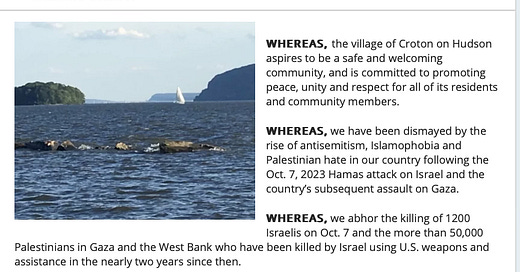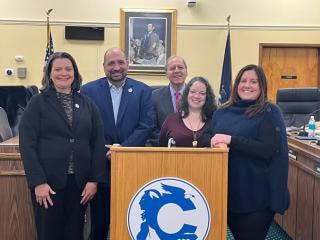Croton Board of Trustees hears plea to pass resolution calling for a ceasefire in Gaza. [Updated July 11]
Some trustees said this was not an issue the board should get involved in, but organizers are not giving up. We think they are morally right to persist.
Last month the Chronicle published a Guest Editorial by Croton-based journalist Michelle Celarier, urging support for a petition asking the village Board of Trustees to pass a resolution calling for a ceasefire in Gaza.
At last evening’s Board of Trustees meeting (July 9), Celarier spoke during the non-agenda public comments segment in support of the proposed resolution. As far we are aware, it was the first time the subject of Gaza has been discussed before—and, very briefly, by—the trustees. Here is the text of Celarier’s remarks:
My name is Michelle Celarier, and I’m here tonight to present a petition signed by 54 Croton residents requesting that the Board of Trustees endorse a permanent ceasefire in Gaza. I understand that this board has a policy of not taking up resolutions related to international affairs, but I am imploring you to reconsider that policy in light of the horrors we see constantly in Gaza, where innocent civilians, including children, are being slaughtered on a daily basis—with arms supplied by the US government to Israel.
Just this week the Israeli media is reporting that Israel’s defense minister has put forth a plan to build a “humanitarian camp” on the ruins of Raffa where Israel plans to “concentrate” 600,000 Gazan citizens and keep them locked in before possible relocation. A CONCENTRATION CAMP. I know many people don’t like to hear the term “ethnic cleansing.” But can it be spelled out any more clearly?
My father fought the Nazis in World War II, and I was brought up not to remain silent in the face of atrocities--like the Germans did. I believe that American citizens need to come together wherever they can to protest the indiscriminate slaughter in Gaza. Over 100 other municipalities in the US have endorsed a ceasefire resolution, and we should too.I will now read the resolution. I believe most people in our village—and indeed our country-- would agree with it.
Celarier proceeded to read the resolution, which can be found at this link.
During the Reports segment of the meeting, which normally takes place just before the body adjourns, trustees Cara Politi and Nora Nicholson responded to Celarier’s comments. In essence, they agreed with the seriousness of the Gaza tragedy, but said that it was not the place of the village board to weigh in on issues it had no influence over.
Mayor Brian Pugh did not address the issue himself, but refused to allow Celarier to respond further to the comments that Politi and Nicholson had made. (While it is routine to restrict public comments to five minutes and not allow villagers to speak twice, the board can vote to waive these rules if it wishes to.)
We have credible information that Mayor Pugh does not favor bringing this issue before the full Board of Trustees, in part because he believes it would be divisive for the village if that were done.
In further comments to the Chronicle, Celarier told us that she had wanted to tell the trustees that the board did indeed have a history of passing resolutions on issues over which it had no control. After the meeting, she went up to the trustees, particularly Politi and Nicholson, and told them that.
“I also thanked them for hearing me,” Celarier told us. “And I do believe that they are concerned about what is going on in Gaza.” But, she added, “I was very disappointed that the mayor could not even say that he echoed their concerns --that what is going on in Gaza is horrible.”
Celarier says that a number of people active in the petition campaign were not able to make it to the meeting, but that they would not give up and hoped to organize a larger mobilization for another meeting in the near future.
Chronicle Commentary:
We don’t find it surprising that the mayor and trustees, all members of the Democratic Party, would be reluctant to get involved in the Gaza question, which up until recently has indeed been a divisive subject among Democrats. However, recent polls show that increasingly Democrats, and even many Republicans, have come to believe that Israel is committing war crimes and possibly even genocide in Gaza, just as virtually all human rights organizations and experts—including within Israel itself—have themselves concluded.
Peter Beinart, the editor-at-large of Jewish Currents and a contributing opinion writer at The New York Times, made this point in a July 6 Guest Essay in the Times entitled “Democrats Need to Understand That Opinions on Israel are Changing Fast.” As Beinart pointed out:
“The shift has been national. In 2013, according to Gallup, Democrats sympathized with Israel over the Palestinians by a margin of 36 percentage points. Those numbers have now flipped, after more than a decade of nearly uninterrupted right-wing rule by Prime Minister Benjamin Netanyahu, the rise to power of crude bigots like Itamar Ben-Gvir and Bezalel Smotrich, and Israel’s mass slaughter and starvation of Palestinians in the Gaza Strip: This February, Gallup found that Democrats sympathize with Palestinians over Israel by a margin of 38 percentage points. According to a February survey by The Economist and YouGov, 46 percent of Democrats want the United States to reduce military aid to the Jewish state. Only 6 percent want to increase it, and 24 percent want it to remain at the level it is.”
We understand the mayor’s concerns about dividing the community, which is already in contention over many issues. But given the strong majority of Democratic Party voters in Croton, passing the proposed resolution might not be as divisive as the mayor and some trustees seem to fear—especially since such strong moral issues are at play.
As for Croton’s Jewish citizens (of which the Chronicle’s editor is one) we had an interesting discussion with Rabbi Jennifer Jaech shortly before she left Temple Israel of Northern Westchester, located here in Croton. She pointed out that the temple is part of the Union for Reform Judaism, which has issued many statements raising concerns about Israel's actions in Gaza since that conflict began. While the Union, like all just organizations, has rightly condemned the atrocious attacks on October 7 led by Hamas and insists that the hostages must be released, it has also called for a ceasefire, humanitarian aid to Gaza, and Palestinian self-determination; and the Union has condemned the Israeli extremists currently in power in Israel and behind the almost daily attacks on Palestinians in the West Bank.
As recently as May 12, the president of the Union for Reform Judaism, Rabbi Rick Jacobs, published an opinion piece in The Washington Post entitled "I'm a rabbi. Starving Gaza is immoral." While of course condemning the Hamas-led attacks, Rabbi Jacobs stated:
“A just war, such as Israel's efforts to prevent Hamas from attacking it again and curtailing its governance in Gaza, must be fought with just means that align with both international humanitarian law and the values of Jewish rules of war."
He added: "Starving Gazan civilians neither will bring Israel the 'total victory' over Hamas it seeks nor can it be justified by Jewish values or humanitarian law."
As Rabbi Jaech said to us, “We have not been silent.”
We think that the serious moral issues involved in the Gaza question should supersede any formalistic rules about when our local community should take a principled stand, and that invoking such rules can often be an excuse for shirking one’s moral responsibility. As a thought exercise, let’s say that the Croton Board of Trustees had found out during the early 1940s that the Holocaust was under way in Europe. Would it have been a legitimate position to say that we as a community should have nothing to say about it because we supposedly could not influence events, or because it was something happening overseas that was none of our business as a village and a community?
We don’t think so. History shows that taking a moral stand is indeed a way of influencing events, even if indirectly. At the very least, we should not make excuses for what many think is a moral failure, including on the part of some who profess to believe in justice and the value of human life, to call out by name what is happening in Gaza.
Divisive? Since when has difference of opinion stopped this community from debating issues and the board from making decisions that not everyone agreed with? Let the board take up the proposed resolution, let’s have a debate involving the entire community, let’s have those who sincerely believe that Israel is committing war crimes present their evidence in public comments, teach-ins, and other venues, and let those who disagree make their arguments as well.
In other words, let’s make Croton, which claims to be a leader in so many areas—from affordable housing to clean energy—a moral leader as well.
Update July 11: In her remarks to the trustees, Michelle Celarier mentions that more than 100 municipalities in the U.S. have passed ceasefire resolutions similar to what she is asking our village board to vote for. Wikipedia does indeed list that many, although not all of them have links or verification. In New York State, however, Albany, Newburgh, and Beacon have passed such resolutions. See the links for details.
***********************************************************************************************************
To share this post, or to share The Croton Chronicle, please click on these links.
Comments policy: No personal attacks or hate speech, please be polite and respectful at all times.






Can someone please explain to me what the impact of this will be other than some virtue signaling? Why should a local village of 4 square miles and 8,000 some-odd people - more or less a bedroom community - waste precious time on something that is clearly wider in context? It's not like anyone anywhere in the world is going to say "Ohh, look at Croton's resolution! We better stop the war!"
Question for Balter. Were you aware of this petition or the movement toward this ridiculous, one-sided screed, when you generously gave Ms. Celarier a platform, in which she presented a completely distorted view of an "Israeli invasion of Gaza", filled with Hamas "facts".
In short, what part do you play in the background, with this.